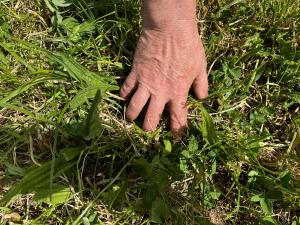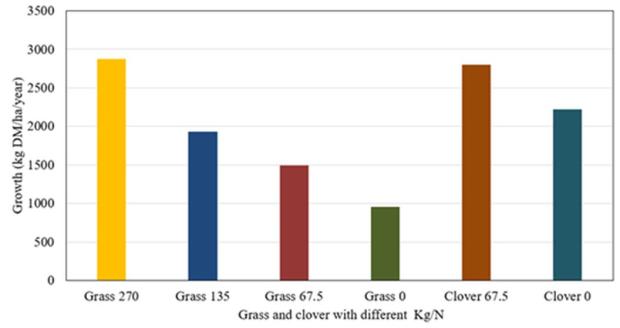Sward diversity strengths during the recent dry spell
Date published:
The benefits of legumes in agriculture have long been recognised but not many appreciate their ability to sustain growth during dry spells such as we have recently experienced in N. Ireland.

In the CloverCheck project grass/clover swards were established at AFBI Hillsborough in 2023 and are routinely assessed for herbage yield and quality alongside conventional perennial ryegrass swards. Swards are fertilised at four different rates of fertiliser N from zero to 270kgN/ha (=8bags/ac 27%N) spread over the growing season, with grass plots cut every 3 weeks, clover every 4 weeks.
Figure 1 shows how grass and grass/clover have performed so far this year i.e. accumulated herbage yield from March to May 2025.

Key points:
Clover zero swards have yielded slightly more than grass+135kgN/ha
Clover swards with 67.5 kgN/ha have produced similar yield as grass +270 kgN/ha
This clearly shows that biological nitrogen fixation has lead to considerable sward growth, whether with zero or low fertiliser N added
And despite the lower rainfall this spring and the recent hot weather, clover-based swards continue to thrive.

Although there are still challenges around the practicalities of weed control options and persistency of legumes, they are proving to be more resilient and adapted to changing weather patterns. Another AFBI study has shown that deep rooting Plantain can be grown and utilised successfully alongside perennial ryegrass in dairy cow paddock grazing systems. Trial results show that performance of the grass/plantain sward was similar to grass-only for herbage and animal productivity but exhibited complementary growth throughout the season especially noticeable during erratic weather periods.
And when all components are brought together in a multi species sward, the drought resilience is clear to see. The photographs below show the impact of the recent hot, dry weather on regrowth of a perennial ryegrass sward and a ryegrass/timothy/plantain/birds foot trefoil/red&white clover sward at AFBI Hillsborough 10 days after silage harvest.
Looking to the future - the benefits of greater species diversity in our grasslands may help to improve sward resilience in the face of increasingly erratic weather patterns.
Notes to editors:
AFBI is an arms-length body of DAERA delivering research and development, diagnostic and analytical testing, emergency response capability and expert scientific advice for DAERA and other government departments, public bodies and commercial companies in Northern Ireland, and further afield.
AFBI’s Vision is “Scientific excellence delivering impactful and sustainable outcomes for society, economy and the natural environment”.
AFBI’s Purpose is to deliver trusted, independent research, statutory & surveillance science, and expert advice that addresses local and global challenges, informs government policy and industry decision making, and underpins a sustainable agri-food industry and the natural and marine environments.
AFBI’s strategic priorities:
- Leading improvements in the agri-food industry to enhance its sustainability;
- Protecting animal, plant and human health;
- Enhancing the natural and marine environment;
- Delivering quality outcomes and impact;
- Enabling world class science through excellence in people, places & technology.
CloverCheck and Plantain studies are co-funded by the DAERA Evidence & Innovation fund and AgriSearch NI.